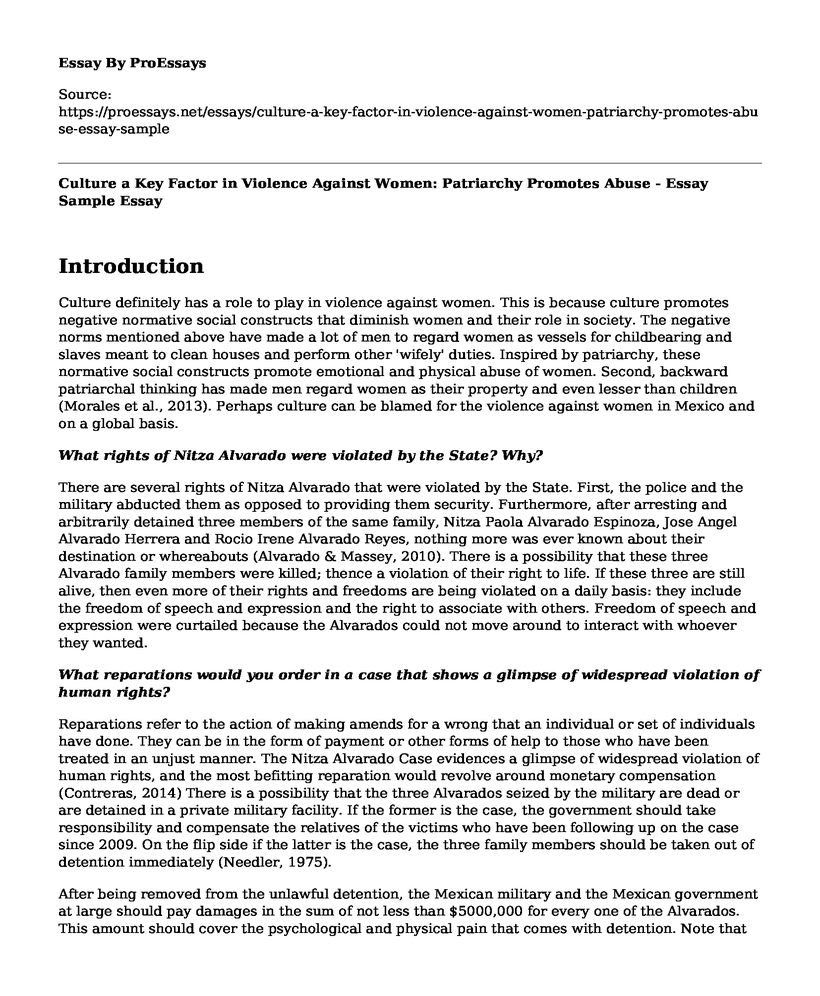Introduction
Culture definitely has a role to play in violence against women. This is because culture promotes negative normative social constructs that diminish women and their role in society. The negative norms mentioned above have made a lot of men to regard women as vessels for childbearing and slaves meant to clean houses and perform other 'wifely' duties. Inspired by patriarchy, these normative social constructs promote emotional and physical abuse of women. Second, backward patriarchal thinking has made men regard women as their property and even lesser than children (Morales et al., 2013). Perhaps culture can be blamed for the violence against women in Mexico and on a global basis.
What rights of Nitza Alvarado were violated by the State? Why?
There are several rights of Nitza Alvarado that were violated by the State. First, the police and the military abducted them as opposed to providing them security. Furthermore, after arresting and arbitrarily detained three members of the same family, Nitza Paola Alvarado Espinoza, Jose Angel Alvarado Herrera and Rocio Irene Alvarado Reyes, nothing more was ever known about their destination or whereabouts (Alvarado & Massey, 2010). There is a possibility that these three Alvarado family members were killed; thence a violation of their right to life. If these three are still alive, then even more of their rights and freedoms are being violated on a daily basis: they include the freedom of speech and expression and the right to associate with others. Freedom of speech and expression were curtailed because the Alvarados could not move around to interact with whoever they wanted.
What reparations would you order in a case that shows a glimpse of widespread violation of human rights?
Reparations refer to the action of making amends for a wrong that an individual or set of individuals have done. They can be in the form of payment or other forms of help to those who have been treated in an unjust manner. The Nitza Alvarado Case evidences a glimpse of widespread violation of human rights, and the most befitting reparation would revolve around monetary compensation (Contreras, 2014) There is a possibility that the three Alvarados seized by the military are dead or are detained in a private military facility. If the former is the case, the government should take responsibility and compensate the relatives of the victims who have been following up on the case since 2009. On the flip side if the latter is the case, the three family members should be taken out of detention immediately (Needler, 1975).
After being removed from the unlawful detention, the Mexican military and the Mexican government at large should pay damages in the sum of not less than $5000,000 for every one of the Alvarados. This amount should cover the psychological and physical pain that comes with detention. Note that physical pain is a consideration that the three Alvarados were tortured through methods like waterboarding while they were in custody (Nguyen, 2000). What's more, the money is supposed to cover the financial gain that the Alvarados would have realized supposing they involved themselves in formal employment or business ventures had they not been put under lock and key on a 24/7 basis.
References
Alvarado, S. E., & Massey, D. S. (2010). Search of peace: Structural adjustment, violence, and international migration. The Annals of the American Academy of Political and Social Science, 630(1), 137-161.
Contreras, V. R. (2014). The role of drug-related violence and extortion in promoting Mexican migration: Unexpected consequences of a drug war. Latin American Research Review, 49(3), 199-217.
Morales, M., Morales, O., Menchaca, A., & Sebastian, A. (2013). The Mexican drug war and the consequent population exodus: transnational movement at the US-Mexican border. Societies, 3(1), 80-103.
Needler, M. C. (1975). Military motivations in the seizure of power. Latin American Research Review, 10(3), 63-79.
Nguyen, A. M. (2000). The Torture Convention: A Gap Filler for the Holes in US Asylum Policy Towards Victims of Domestic Violence. Sw. UL Rev., 30, 171.
Cite this page
Culture a Key Factor in Violence Against Women: Patriarchy Promotes Abuse - Essay Sample. (2023, Feb 13). Retrieved from https://proessays.net/essays/culture-a-key-factor-in-violence-against-women-patriarchy-promotes-abuse-essay-sample
If you are the original author of this essay and no longer wish to have it published on the ProEssays website, please click below to request its removal:
- Chemistry of Nicotine and Caffeine Addiction
- Biography of Charlotte Perkins
- Why Women Were Separated by Sex Essay Example
- Essay Sample on Human Trafficking: Benefits to Traffickers in the Global Era
- Women's Fight for Equality: The Second Wave of Feminism - Essay Sample
- Homelessness & Quality Healthcare: A Global Challenge - Essay Sample
- Free Essay Sample on Understanding Social Determinants & Cultural Awareness in Healthcare







